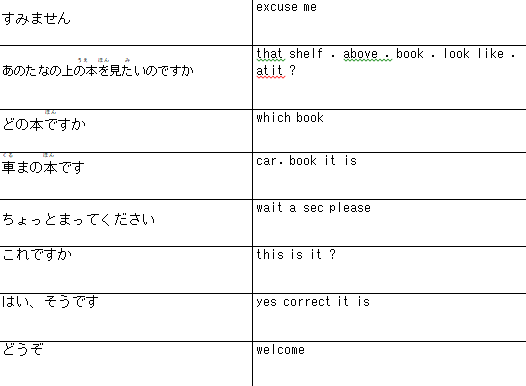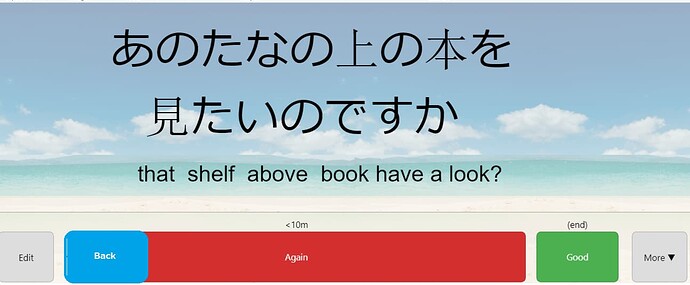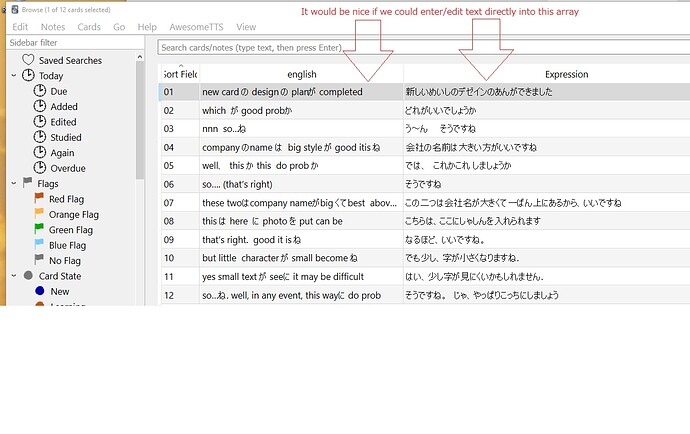The Anking hub project would allow this to happen
Hello, glad to hear that.
I was thinking that it would be very cool if there is an add-on to automatically record pinyin of Chinese characters into a field. I am not a programmer and have no clue how to do it, but it would save me lots of time.
Cheers!
Alex
I’m so excited for ankihub!!!
The best idea is to update this addon Advanced Previewer
When I make cards I tend to make a batch of them and I switch between English Hiragana and Katakana, now you can do that by pressing a few key strokes but it would be easier to stick to the same alphabet and do all the English then all the Japanese(hirigana/katakana).
I can do than now by creating cards, just doing the English, then go into browse and fill in the Japanese. It would be easier though if I could enter the text in spreadsheet style.
I know you can do it in excel, export it then bring it in, I have done that, it’s slow. What would be nice would be if anki allowed you to browse to a deck, then see all the fields in columns and edit straight into those columns.
I have a bunch of cards that I do English and Japanese , works fine but I also have some that are split into stories i.e. create a deck and stick in a sequence of sentences. Then I go through the deck in order, tricky part here is I have to create a Filtered Deck so it can be in order and I can do it multiple times.
( I suspect that should cause some screams, I am breaking the spaced repetition )
Nonetheless, it makes no sense to learn the story of Mother Goose if the sentences are all mixed up.
Example That book

So I create a word document that has the Japanese and English for a story then copy the text into a deck. Now if I create a FD I can then run through the deck in order multiple times. Each card is a sentence and I can step through my stories easily multiple times. For your interest I have all the words as individual cards with english hirigana katakana kanji as appropriate but you can’t easily stick a whole story onto one card, it’s much easier to do a story one sentence at a time, but then it has to be in order hence the FD.
So what would I like :
To be able to create a deck of cards that can be studied in order EVERY time and record the whole deck as GOOD and or EASY.
It would be nice if you could also have forward and backward navigation , currently you can only navigate forward through cards.
I’d like an add-on which would convert all weird encoding formats in audio tracks to ones which work across all my devices.
I swap between desktop and iPhone and iPad Anki regularly throughout the day. Some of my decks come from sources who insist that FLAC is the only legitimate way to encode audio. Works fine for desktop, but not iOS.
I’d like to just find all the FLAC audio in the audio folder, re-encode it to MP3, and then rewrite all the cards which referenced the FLAC, and then upload it to AnkiWeb.
It would be preferable if the resulting re-encoding was identical for all users so that any de-dupe being used on AnkiWeb could take care of it.
I am several days away from embarking on this project myself. I’ve been madly hacking on python recently and it is just a matter of time….
Yes. I have a BIG IDEA which is in line with the work you have already done.
It will require cooperation with Damien, so please consider sharing some of your generous donation with him to make this happen.
All of us (and humanity at large) would benefit greatly from the development of a more robust market for anki deck sharing.
Imagine, for example, how much we could speed up the rate of innovation to find solutions to difficult problems like cancer, alzheimer’s and COVID-19, for example, if newly discovered knowledge could be more rapidly shared with a larger number of people.
Imagine this future which I believe will come to pass …
1: AnkiWeb as the next generation of Wikipedia
IMHO a decentralized anki deck sharing market will be so heavily utilized that it will replace the now heavily censored Wikipedia and provide a means to subvert the censorship and centralized narrative control.
i.e. Every Wikipedia page can be efficiently converted to a well structured anki deck. If conflicts exist over the content to be included, each creator can have the freedom to fork the content and each user can have the freedom to explore alternative content.
2: Every medical research paper as an anki deck (+ ability to load decks for cited papers)
The failure of information sharing for COVID-19 has arguably led to the unnecessary deaths of millions. Men and women of good conscience should work to ensure that this never happens again.
More so, the perverse incentives at work in academia and industry favor the accumulation of wealth, status and power by big corporations over meeting human needs.
One way to solve this problem is to enable independent researchers to attain a rate of innovation that exceeds the ability of corporations to hinder the rate of innovation with (1) patents and (2) their use of accumulated wealth to buy politicians, media and social media.
Background: Letter | Start a Conversation
3: A premade anki deck for every course offering
The exponentially growing rate of innovation is creating the conditions such that all of us are feeling the pressure to both
(1) learn new things faster and
(2) retain the information that we have already learned with less effort.
This, in turn, is creating the conditions whereby premade anki decks are going to be offered by educators to supplement their existing offerings.
Why will this happen?
Because this would significantly reduce the amount of grunt work required to be done by the student, which would enable them to spend more time actually learning and retaining their subject matter material.
How to make this happen?
The dream of rapid knowledge sharing via the sharing of anki decks is hindered by the pain associated with deck sharing.
What is the origin of that pain?
In order for the deck to render properly, the user needs to have
(1) the correct version of anki and
(2) the correct version of all of the addons.
For example, most of my decks heavily use Glutanimate’s “Cloze Overlapper” addon.
This addon currently only works with the 2.1.26 version of Anki.
This means that, in order for another user to view one of my shared decks, they need to
1: Install the 2.1.26 version of Anki
2: Install the correct version of “Cloze Overlapper” (which requires a Patreon subscription fee)
3: Install the correct version of all of the other addons that I am using.
i.e. The “cost” of deck sharing is too high.
When considering whether to take an action, humans make a cost/benefit calculation.
Most of the time, the potential “benefit” of loading a shared deck does not outweigh the “cost” of the hoops you have to jump through to load that deck correctly.
But what if
(1) the requirements (anki kernel version + anki addon versions) were contained within the shared deck in a machine readable fashion
For example, like a python pip requirements file.
AND
(2) we had an addon / core anki feature which could
(a) read these requirements and
(b) automatically load the correct versions of the anki kernel + addons to render the deck.
This would significantly lower the “cost” of deck sharing and, in so doing, create conditions more favorable to the emergence of a market for deck sharing.
This is in line with the excellent work that the AnKing team has already done on the Butler addon.
Readers who are not familiar with this excellent product should check it out here:
Info:
Sorry. New users are limited to 2 links per post
Download (by anki version):
Sorry. New users are limited to 2 links per post
P.S. IMHO the Cloze Overlapper addon is an extraordinary innovation. I have made several feature requests here:
There are, of course, still other barriers which hinder the emergence of a robust market for deck sharing.
IMHO, these include:
1: Inadequate ability to order subdecks & cards within a deck
The inability to order subdecks and cards within the deck unless the deck names are prepended with numbers.
It is difficult to guide the user through the order in which subdecks should be explored without the ability to order the decks.
But the “cost” of ordering is too high if it requires renumbering deck names every time a new subdeck is ordered.
2: The absence of deck dependency specifications
In order to “understand” the concepts contained within a deck, it is necessary to understand the prerequisite concepts.
Currently, I am unaware of any means by which to LINK to the other decks which contain these concepts.
If this feature existed, the “deck creator” could simply add URLs to the missing concepts and the “deck users” could simply load the prerequisite concepts necessary to understand the current concept they are struggling to understand.
3: Insufficient support for decentralization
Although there are no barriers to prevent the loading of either addons or decks from non-centralized locations, the ability to load either by URL, and the ability of the deck creator to specify dependent addons and decks by URL would significantly increase the conditions favorable towards the development of a robust decentralized deck sharing market.
4: Lack of a deck diff/patch tools
Programmers will be familiar with the diff and patch tools. The diff tool allow 2 source code files to be compared in order to see the difference between them. The patch tool enables diff-based patches to be submitted and reviewed for inclusion.
Patches to the linux kernel, for example, are submitted in this fashion.
The ability to do a deck diff & patch would significantly increase conditions favorable to the development of a robust deck sharing market.
Why?
For “deck users”:
It would, in part, allow for deck enhancements to be loaded in a fashion such that the user could be alerted to them so that they could be reviewed and scheduled according to the individual user’s needs.
For “deck creators”:
It would enable teams of creators to collaborate on decks using the same set of software tools that are used to collaborate on open source projects and to share their collaborations on github, gitlab, bitbucket, etc.
5: The lack of easy dana for creators
Dana is the Buddhist term for generosity.
The ability to offer donations to creators of addons and shared decks (and the core anki team: Thank you Damien. We are so grateful for Anki.), would significantly increase conditions favorable to the development of deck sharing. I would strongly suggest that this be done via cryptocurrency. Preferably with bitcoin. Preferably with satoshis on the lightning network.
Ideally, I would imagine loading a shared deck and seeing a popup listing all of the creators who contributed to making this offering possible (the deck creators, the dependent deck creators, the addon creators and the dependent addon creators) and a suggested donation of satoshis to each that can be simply clicked, or edited and clicked, for the funds to be instantly transferred on the lightning network.
Thank you for your consideration.
Please bring Popup Dictionary to 2.1.46!
I think the Google Translate add-on allows this. Haven’t personally used it though
We are too!
Added this to the list
This is HUGE (and would be cool). Not something we have funding for at the moment, unfortunately. However once we get AnkiHub going, then this is definitely a possibility
It should be released this week hopefully
To everyone Else that we didn’t reply to you, I have read through everything and started a list that we are going to have somebody work on. Unfortunately at the moment we have limited funds, however we hope to have more in the future and can continue projects like this to better help the community
At some stage in the future, if you are feeling adventurous, please consider reaching out to Silicon Valley entrepreneurs and investors.
They tend to be excited by big ideas that could change the world.
One huge unmet need that many are focused on at the moment is the need to subvert the suppression of accurate medical information by the “Trusted News Initiative” which has, arguably led to the unnecessary deaths of a great many people and the erosion of trust in public health.
See here …
… starting at 35:10.
I would recommend reaching out to Steve Kirsch, for example.
People are willing to invest big $ if you can help them to solve this life or death problem.
I’m not quite sure a password would help you.
For one, people could just export the flashcards from their Anki once they have imported them using the password. This way, they’d get a shareable file without any password.
Secondly, it’d be very easy just to share the password along with the flashcards, rendering the password useless.
Love this initiative. Thanks!
Idea #1: Enhanced Timebox
I’d like to see the timebox feature enhanced a bit. Right now it just says how many cards were seen during the timebox. That is nice. But I think it could be enhanced like in the image below.

If someone answers a certain number of cards or achieves a certain percentage of accuracy, then the timebox popup might also give some type of congratulation message. The levels needed could be set in the config.
Idea #2: Updating some of the graph addons to work with the current Stats screen
There are some great graphs and stats page addons that would be great to have working on the new/current design for the Stats window. Here are some examples:
- Progress Graphs and Stats for Learned and Matured Cards
- Time per revised card graph
- True Retention by Card Maturity
Idea #3: Anything that gamifies study
A number of addons have worked on gamification, and have been creative, but many of them then stagnate in their development. A robust effort to help increase the gamification side of Anki could be nice and help expand the user base.
Idea: Better Sibling Handling
Anki 1 used to offer more robust handling of siblings. In Anki 2, a sibling is just buried until the next day. This works for reviews with small intervals, but for people who have been studying for years, and have mature decks and deeply mature cards, spacing a sibling card apart by a single day is barely helpful.
For example, if one sibling card has a 1.5 year interval and another has a 2.5 year interval, but they both come due on the same day, then spacing them apart by one day has little value. In such a situation, it would be better to space them apart by a week or two at least.
In Anki 1, as far as I recall, cards used to be buried based on percentage. So a card could be buried for up to 10% of its interval in order to create space between sibling reviews. I think there was also a minimum interval. (It’s been a long time, so details are hard to recall). Nevertheless, the point was that sibling burying was more robust. This was eliminated for a few reasons, including that if someone has lots of cards generating per note, then sometimes a card might keep burying while the siblings were shown. But I personally think that this would only affect a very small percentage of users, and that the majority of users could benefit from better sibling handling. That said, I think Damien has mentioned that it is not an easy fix, and I’m not sure if an addon could handle it all, but it would be great if it could! Wish you all the best!
Hi,
Under the notion of password was implied the notion of flashcards protection against downloading them to the desktop or sharing them with others.
Furthermore, it is very easy to share a password but it is also very easy to change it so it’s not really a problem.
This kind of shared but protected data exist for example in Google drive.
I have now found that I can change the fields that are displayed in browse, so I can display the fields I would like to edit and we just need a means by which we can edit in the table rather than having to use the edit dialog
Not sure I understood your suggestion fully, but I think you want to emulate Anki Desktop on mobile?
I think this is a bit ambitious for an add-on (some poor person would have to support it for years).
Down the road, the mobile clients will share an increasing amount of UI elements with Anki Desktop, so it is not unlikely that there will be cross-platform add-ons in the future.
Clozes already have their own class: .cloze
So it’s really easy to style them to your liking with the template editor ![]()
Edit: Ah you mean the ones that are not active. True, those are currently not accessible via the DOM. Take a look at the Closet add-on for that.


